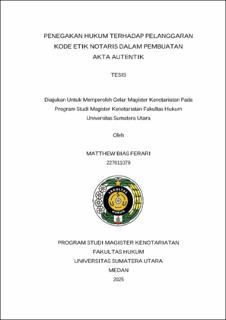Penegakan Hukum Terhadap Pelanggaran Kode Etik Notaris Dalam Pembuatan Akta Autentik
Law Enforcement for a Violation of Notarial Code of Ethics in Making an Authentic Deed

Date
2025Author
Ferari, Matthew Bias
Advisor(s)
Purba, Hasim
Suprayitno
Metadata
Show full item recordAbstract
The difference between Article 70 sub a of Law Number 30 of 2004 which states
that the Regional Supervisory Council has the right to hold a hearing to examine alleged
violations, and Article 2 of Regulation of The Minister of Law and Human Rights Number
15 of 2020 which states that the Supervisory Council is also authorized to provide
guidance and supervision of notaries is the basis for this research by discussing three
issues: (1) How is the law enforcement mechanism against violations of the notary code
of ethics in making authentic deeds? (2) What are the factors that influence violations of
the code of ethics in making authentic deeds? and (3) How are efforts made in order to
overcome violations of the notary code of ethics in making authentic deeds?
This research uses normative legal and empirical legal methods. Normative
research is conducted by examining the laws and regulations concerning the Office of
Notary which is Law No. 2 of 2014. Empirical legal research is conducted by examining
the legal relationship between the community and the problem under study. With primary
data in the form of questionnaires, interviews and secondary data in the form of books,
journals, and legal regulations related to this research then processed and analyzed
qualitatively.
The Regional Supervisory Council plays a role in conducting examinations
related to public complaints against notaries by examining the complainant and the
reported party, then recommending minor sanctions to the Regional Supervisory Council,
while the Regional Supervisory Council can propose moderate and severe sanctions to
the Central Supervisory Council. Notary compliance in making authentic deeds is
influenced by several factors, such as partiality to one of the parties, lack of care in
preparing deeds, and excessive trust in employees in the process of making deeds and not
checking again. As a coaching effort, the Regional Supervisory Council routinely
conducts annual socialization to notaries and protocol checks once a year in accordance
with Article 70 letter b of Law Number 30 of 2004 concerning the Notary Position, which
is also a moment to conduct checks as well as provide direct guidance.
There is an overlap of law enforcement mechanisms carried out between the
Regional Supervisory Council and the Honorary Council, preferably for violations of
office resolved by the Regional Supervisory Council and for violations of conduct
resolved by the Honorary Council. In addition, the enforcement of strict sanctions against
notaries who are proven to have committed violations, such as partiality or inaccuracy
in the preparation of deeds, needs to be improved in order to increase notary compliance
and prevent the recurrence of similar violations in the future. Socialization to notaries
should also be conducted more frequently, not just once a year, with a focus on regulatory
updates and current cases to improve understanding and compliance with the law and
the notary code of ethics.
Collections
- Master Theses (Notary) [2330]
